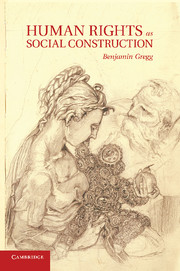Book contents
- Frontmatter
- Contents
- Acknowledgments
- Introduction
- Part I This-Worldly Norms: Local Not Universal
- Part II This-Worldly Resources for Human Rights as Social Construction
- Part III This-Worldly Means of Advancing the Human Rights Idea
- Part IV Human Rights, Future Tense: Human Nature and Political Community Reconceived
- References
- Index
Introduction
Human Rights as Local Constructions of Limited but Expandable Validity
Published online by Cambridge University Press: 05 January 2012
- Frontmatter
- Contents
- Acknowledgments
- Introduction
- Part I This-Worldly Norms: Local Not Universal
- Part II This-Worldly Resources for Human Rights as Social Construction
- Part III This-Worldly Means of Advancing the Human Rights Idea
- Part IV Human Rights, Future Tense: Human Nature and Political Community Reconceived
- References
- Index
Summary
Jeremy Bentham's pungent critique of one conception of rights – rights valid independently of all institutions, and valid regardless of whether they are recognized by anyone – remains more quotable than any other, even after 170 years or so: “Natural rights is simple nonsense; natural and imprescriptible rights, rhetorical nonsense, – nonsense upon stilts” (Bentham 1843:501). Aimed at the revolutionary French Assembly's Déclaration des droits de l’Homme et du Citoyen of 1789, his critique follows directly from his premise: rights are the “child of law: from real laws come real rights; but from imaginary laws, from laws of nature…come imaginary rights” (Bentham 1843:523). How has Bentham's claim fared after so many years? On the one hand, the ancient legacy of natural and imprescriptible rights retains its attraction today, most powerfully in the notion of human rights. Perhaps Bentham might sense at least some vindication in the fact that, as a matter of empirical observation, we find in the world today, as ever, no agreement as to whether human rights exist or even can exist – and if they exist, of what provenience, let alone what rights those might be in particular, and which are fundamental, and which secondary. For the social constructionist approach I take, provenience is a matter of history and contingency rather than, say, necessary truths discoverable by man if not eternal verities revealed to the elect. And as a matter of contingent fact, there are no generally accepted histories of the idea of human rights or even of movements for human rights; there are instead more than a few competing histories. To take but one recent example: Samuel Moyn asserts that the human rights idea emerged, at least in its current status in global political discourse, only in the 1970s rather than, say, with the moral intuitions of venerable and primordial religions, or in the American and French Revolutions, or with the post-Holocaust United Nations(UN) in the 1940s, or with the Universal Declaration of Human Rights in 1947. In Moyn's account, human rights emerged as the next great utopia following the exhaustion, if not failure, of various earlier utopias from which morally needy idealists now sought to distance themselves. Such utopias span quite an arc, from anticolonialist nationalism to communism to humanism to hopeful visions of the nation-state: “Born of the yearning to transcend politics, human rights have become the core language of a new politics of humanity that has sapped the energy from old ideological contests of the left and right” (Moyn 2010:227).
- Type
- Chapter
- Information
- Human Rights as Social Construction , pp. 1 - 10Publisher: Cambridge University PressPrint publication year: 2011

